Just 1 in 5 oppose equal marriage in Northern Ireland
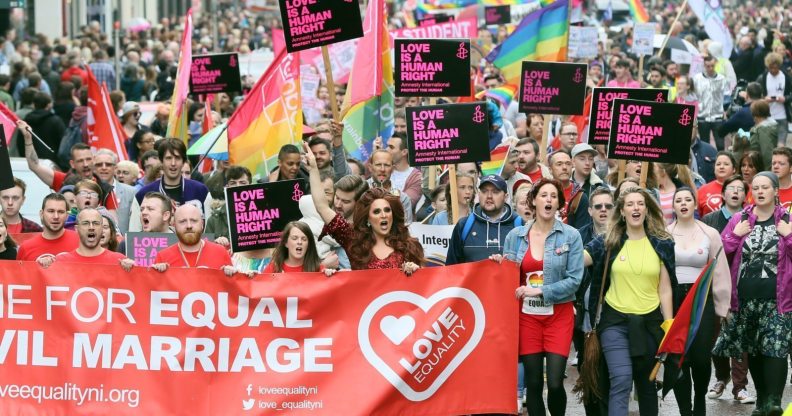
Gay rights campaigners take part in a march through Belfast on July 1, 2017 to protest against the ban on same-sex marriage.
A poll has found that fewer than one in five people in Northern Ireland are opposed to equal marriage – despite a political stalemate that has left gay people without marriage rights for years.
Northern Ireland is the only part of the UK that continues to ban same-sex marriage, as the ultra-conservative Democratic Unionist Party has blocked progress on the issue despite public support for equality.
Following the collapse of Northern Ireland’s devolved power-sharing government, campaigners say the responsibility for bringing about equal marriage now lies with the UK Parliament.
UK Prime Minister Theresa May recently said the issue should wait until the Northern Ireland Assembly is restored, but backbench MPs in Westminster have begun a push for legislation that could bring about equality sooner.
The movement was given a boost today by a new poll that shows an overwhelming majority of people in Northern Ireland are in support of equality.
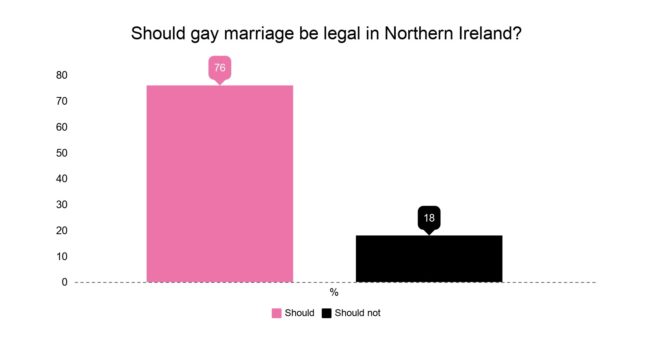
The Sky Data poll shows that 76 percent of people in Northern Ireland think same-sex marriage should be legal, with just 18 percent – less than one in five – opposed.
The poll demonstrates a surge in support on the issue, climbing from 68 percent support in 2015.
There is also a political majority for equality in the country, with the Northern Ireland Assembly previously passing an equal marriage bill that was only hindered by the DUP employing a peace process power known as a ‘petition of concern’ to block it.
Following the poll, campaigners reasserted pressure on the UK government to introduce equal marriage in Northern Ireland and bring the region into line with the rest of the UK.
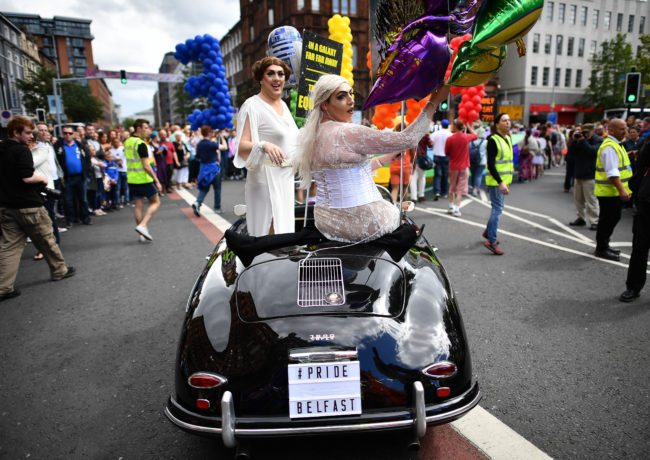
Drag queens wave to the crowd as Belfast Gay Pride takes place on August 5, 2017 (Charles McQuillan/Getty Images)
Patrick Corrigan of Amnesty International and the Love Equality campaign said: “We welcome this huge and ever-growing level of support for marriage equality in Northern Ireland. Whatever else people in Northern Ireland may remain divided on, it is clearly not marriage equality.
“We are calling on the UK Government to recognise this huge public support for change. With no functioning devolution at Stormont, it is now time for the UK Government to legislate to bring Northern Ireland into line with the rest of the UK and Ireland and to end discrimination against the LGBT+ community.
“Under the political surface, on human rights and equality issues such as equal marriage, Northern Ireland has changed. It is worth noting that this overwhelming support for marriage equality among the Northern Ireland public is far in excess of the figures which were seen in Great Britain or the Republic of Ireland in advance of changes in the law there.
“The Prime Minister has previously said that LGBT people in Northern Ireland should have equal marriage rights. This is now her chance to demonstrate action to match those words.”
Twin bills on equal marriage were advanced in the House of Commons and House of Lords last month.
Northern Ireland Secretary of State Karen Bradley has said the Government will allow a free vote on the bills as a “matter of conscience.”
But Prime Minister Theresa May emphasised in Parliament that she would rather the issue was dealt with by the Northern Ireland Assembly.
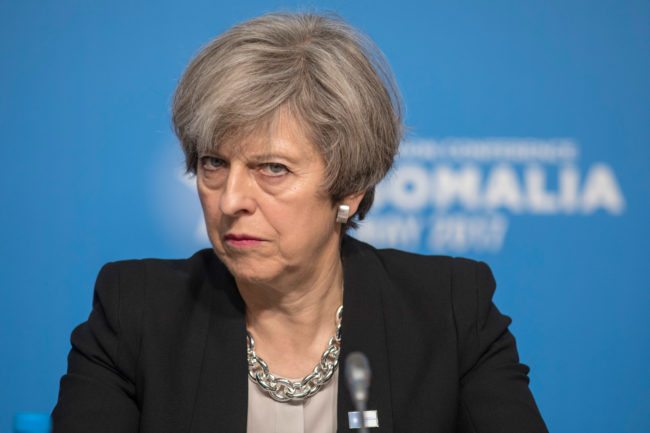
Prime Minister Theresa May (Photo by Jack Hill – WPA Pool/Getty Images)
Challenged by Labour’s Ged Killen, she said: “I hope the Hon. Gentleman will recognise the record that this government has in relation to LGBT rights, because this is an issue we have taken up and we have championed.
“I think the Hon. Gentleman will find that it is previous legislation, under the last Labour government, that ensured this was a devolved matter. We hope that there will be a Northern Ireland Executive in place soon that will be able to address these issues.”
In an interview with PinkNews in Westminster last month, the leader of Sinn Féin in Northern Ireland Michelle O’Neill gave her backing to legislation in Westminster – even though, as republicans, Sinn Féin do not typically recognise the authority of the UK Parliament over Northern Ireland.
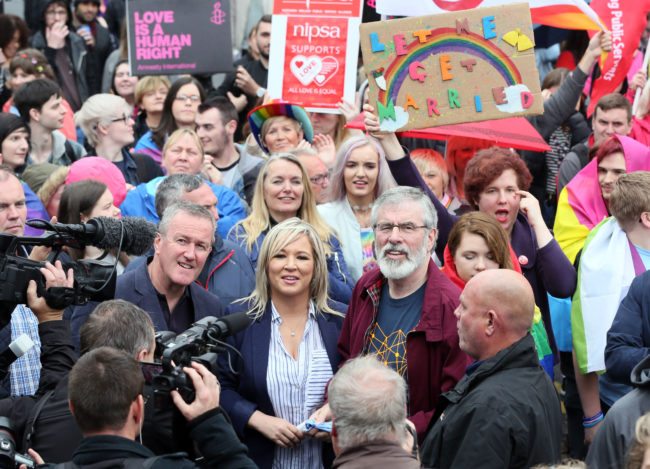
Sinn Fein President Gerry Adams (R) and Northern Leader Michelle O’Neill join gay rights campaigners in a march through Belfast on July 1, 2017 to protest against the ban on same-sex marriage. (PAUL FAITH/AFP/Getty)
Ms O’Neill told PinkNews: “We have no government in the North at the moment, we haven’t had for 14 months, and one of the issues that’s right at the heart of the political impasse is the fact that we weren’t able to secure marriage equality in the Assembly despite quite a number of attempts.
“I was very clear throughout the [recent power-sharing] negotiations that if I wasn’t able to secure it as a deal with the DUP, we would go an alternative route.
“Obviously, as an Irish Republican, it does not sit easily with me that we would legislate here in Westminster – but we believe there is a way to do it.
“We are happy and content that this is a route that can hopefully lead to a positive outcome for our citizens who just want the same rights that people have elsewhere. It’s a very reasonable request.”

